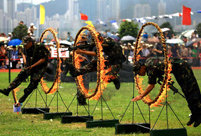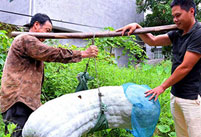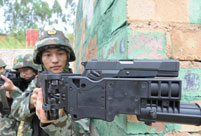 Vintage cars show kicks off in London
Vintage cars show kicks off in London
 Gorgeous scenery in NE China
Gorgeous scenery in NE China
 Picturesque Barkol grassland in Xinjiang
Picturesque Barkol grassland in Xinjiang
 Small Wild Goose Pagoda - A World Cultural Heritage Site along the Silk Road
Small Wild Goose Pagoda - A World Cultural Heritage Site along the Silk Road
 Maritime Silk Road Luxuries of the Han Dynasty
Maritime Silk Road Luxuries of the Han Dynasty
 Ciao! Chinese beauties!
Ciao! Chinese beauties!
 An eye feast: BFA freshmen registration
An eye feast: BFA freshmen registration
 Top 10 most lavish weddings
Top 10 most lavish weddings
 Most amazing chi-pao beauties
Most amazing chi-pao beauties
 Chinese lingerie brand arrives in Las Vegas
Chinese lingerie brand arrives in Las Vegas
ANKARA, Sept. 25 -- Turkey, home to 1.5 million Syrian refugees, is prepared to embrace hundreds of thousands more in the face of escalating fight between militants of the Islamic State ( IS) and opposing groups in Syria and Iraq.
The U.S.-led coalition attacks on IS targets in Syria and Iraq is expected to trigger a new wave of refugee flow to Turkey as well, straining Turkish capacity to handle refugees.
"We are waiting for a new wave of refugees," said Turkish Deputy Prime Minister Numan Kurtulmus whose portfolio includes emergency management agency AFAD overseeing refugees in Turkey, adding that Turkey has made necessary preparation for new refugees.
However, Turkish analysts believed the refugee problem that poses significant challenges to Turkey's security, economy and social fabric are not being handled in a serious manner.
"First of all, there are legal loopholes and jurisdictional ambiguities on refugees," Alparslan Akkus, Turkish expert in Ankara, said.
He added that so many agencies and ministries have all involved in addressing different aspects of the refugees.
"None of them has experienced on refugee matters and there is lack of coordination among all," Akkus underlined.
The analyst suggested that Turkey should immediately establish a new ministry specifically on immigration and refugees.
TURKEY FRUSTRATED
Turkey's uneasiness with increasing number of refugees led Turkish President Recep Tayyip Erdogan to express his frustration to world community this week at the United Nations.
Speaking at the General Assembly on Wednesday, Erdogan said there has been great pressure on Turkey's borders in terms of refugee flow.
"In addition to 1.3 million Syrian refugees of all racial and sectarian colors we have accepted, last week we received more than 140,000 Syrian Kurds who fled from IS attacks," Erdogan told the audience in the General Assembly.
"We still temporarily host 70,000 Yazidis from Iraq," he added.
Speaking at the U.S. think tank, Council on Foreign Relations, earlier, Erdogan lashed out at Western countries, saying that Western countries received only 130,000 Syrian refugees in contrast to 1.5 million Turkey hosts.
Stressing that Turkey has spent four billion U.S. dollars on refugees, Erdogan said "if you ask me how much support we've received from the world in total, it's 150 million dollars."
Most of the refugees this week fled the fighting in Kobani, a Kurdish town across Turkish province Sanliurfa on Syrian side of the border that is home to some 400,000 people.
Turkish media reported on Thursday that the IS laid a siege on another village in Qamishli in Syria that is close to Turkish town Nusaybin in the southern province of Mardin.
If the IS attacks on Qamishli with a population of some one million, Turkey will be facing hundreds of thousands of refugees from that part of Syrian border as well.
More refugees will put Turkey in a jam as it runs out of the spaces in existing camps and the new temporary shelters are not enough to accommodate all the incoming refugees.
Most are let go to move in with relatives in Turkey after screening for security and registration process.
BUFFER ZONE
Turkey is lobbying to set up a buffer zone inside Iraq and Syria, protected by no-fly zone, in order to take care of refugees abroad rather in the Turkish territory.
However, Ankara needs the United Nations Security Council resolution to enforce a no-fly zone which seems very difficult to obtain given the resistance from many members of the Security Council.
A well-informed source told Xinhua in Ankara that Turkish officials have been negotiating with the U.S. on setting up a safe zone along Turkish border with Syria and Iraq in exchange for more cooperation with the U.S.-led coalition against the IS.
"The use of Incirlik base in Adana province in southern Turkey for fighter planes in attacks on the IS as well as broader over flight permissions are on the table," he said on the condition of anonymity.
Turkish Prime Minister Ahmet Davutoglu told reporters last week that the U.S. is "much closer (to Turkey's views than before)" on setting up a safe zone to protect civilians.
PROBLEMS COME WITH REFUGEES
"With refugee flow, all kind of problems we see in Syria will be carried over the border to Turkish side," Sedat Laciner, professor of international relations, said.
He warned that terror groups may very well infiltrate into Turkey under the disguise of refugees and may target opposing groups in Turkish soil or attack on Turkish interests directly.
Laciner also noted that increasing number of refugees would put huge strain on Turkey's health, education and social services while helping surge of prices.
In fact, the prices of basic food staples and water have recently risen in Turkish town Suruc where Syrian Kurds come to escape attacks by the IS, Turkish daily Zaman reported on Thursday.
Mehmet Seyfettin Erol, the head of Ankara's International Strategic and Security Research Center (USGAM), said Turkey need the cooperation of regional and global partners in order to cope with growing refugee problem.
"Ankara cannot handle this on its own," he told Xinhua.
 Century-old public bath closes door in Beijing
Century-old public bath closes door in Beijing Military training in Hong Kong
Military training in Hong Kong Teahouses in Chongqing: Worship to the leisure lifestyle
Teahouses in Chongqing: Worship to the leisure lifestyle Giant white gourd weighing 87 kilograms appears in SE China
Giant white gourd weighing 87 kilograms appears in SE China Advanced arms help to safeguard China-ASEAN Expo
Advanced arms help to safeguard China-ASEAN Expo Leading director Wang Quan'an detained for 'buying sex'
Leading director Wang Quan'an detained for 'buying sex' Heaven on earth: Dongjiang Lake in Hunan
Heaven on earth: Dongjiang Lake in Hunan Mixed reaction to smartphone sidewalk
Mixed reaction to smartphone sidewalk Amazing aerial photos of China's Xisha Islands
Amazing aerial photos of China's Xisha Islands Lingerie show at 2014 Miss China
Lingerie show at 2014 Miss China Songstress Li Xianglan dies at 94
Songstress Li Xianglan dies at 94 Police recruiting posters
Police recruiting posters Anshun Daxi- Living fossil of Chinese drama
Anshun Daxi- Living fossil of Chinese drama Urban farmers in China
Urban farmers in China 'Firepower-2014 Weibei'military exercise
'Firepower-2014 Weibei'military exerciseDay|Week|Month